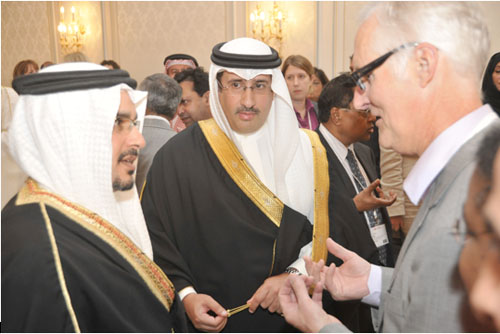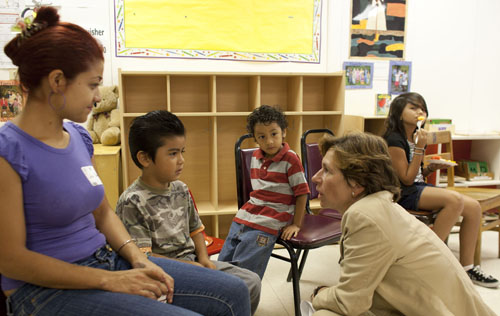
Jeudi Dernier, Je ai assisté à un gala éblouissant de regarder professeur d'éducation spéciale Matthew Cunningham accepter le Teacher Award Chicago GEMS Education inaugurale. Et hier, Je ai écouté Andreas Schleicher présenté les principales conclusions de la 2013 Enseignement de l'OCDE et de l'Enquête internationale apprentissage (UN TEL).
Dans le contexte de l'Education Fast Forward (FEP) Débat 10, “Mieux enseigner pour mieux apprendre: Les résultats de l'enseignement de l'OCDE et de l'Enquête internationale apprentissage (UN TEL),” qui a suivi, Lord David Puttnam nous a rappelé que le changement est douloureux. Comme un jeune joueur de tennis en herbe avec un coup droit qui devait ré-invention, il avait appris cette leçon à la dure au cours du 1er tour de Wimbledon junior quand il était trop tard pour le changement.
Changement dans l'éducation a toujours pris le temps, mais à une époque où la technologie de l'innovation a un impact sur tous les aspects de notre vie quotidienne à un rythme effréné, il est essentiel de comprendre le jour aux questions de jours rencontrés par les enseignants à l'échelle mondiale et se déplacer rapidement d'un point de vue politique pour apporter les changements nécessaires pour améliorer les résultats des élèves.
Je ai demandé à Michael complet, Lord Jim Knight et Pasi Sahlberg de partager leurs points de vue après l'Education Fast Forward (FEP) Débat 10.
Hommes, ne l'étude TALIS poser toutes les bonnes questions?
Pasi Sahlberg: Je pense que l'ensemble, TALIS offre importantes et intéressantes perspectives comparables dans la profession enseignante dans le monde entier. Avez TALIS poser toutes les bonnes questions? Je pense que ce est une question qui sera probablement diviser avis. Ma propre question brûlante que TALIS ne éclaire pas sur la façon dont les enseignants est en croissance rapide Teach for All mouvement affecte et leur travail, surtout dans les pays qui voient nombre de leurs nouveaux enseignants issus de ces programmes enseignant préparation accélérées. Un autre thème qui reste assez silencieux dans cette enquête est de savoir comment leadership important est en rendant les écoles fonctionnent bien. TALIS porté principalement sur les enseignants et beaucoup moins sur les chefs d'établissement.
Michael complet: The TALIS study is valuable to generate a strong debate on the current status of teaching. It fell short because it generated what I call ‘Dangerous Half Truths’ – findings that have some merit but are deficient because they can be easily misinterpreted and result in superficial or harmful policies. Par exemple, the finding that teacher appraisal/feedback can lead to positive change in classroom practice fails to specify under what conditions this would be true (true if there is a collaborative and growth oriented culture; false if there is a punitive carrot and stick culture). The same problem affects the other big factor examined, Professional Development, which again only is effective when it contains strong pedagogical content and is integrated into the school improvement plans of school leaders and teachers working together.
Lord Jim Chevalier: D'une manière générale, oui, the study did ask all the right questions. It is always possible to quibble but it remains very insightful for secondary schools. I would have loved to see elementary school data to make a comparison.
What was the most important take home for you?
Pasi Sahlberg: I think the most interesting take-away for me is teachers’ views of the way society values the teaching profession and how wide the gap is between the countries where teachers feel they are valued and where they feel they are not. It is alarming to me that in France, Sweden and Spain, less than one of ten teachers feels valued. This suggests that it is not just more professional development or more pay that will change this dangerous trend, but more fundamental change in the role of how teachers are treated is needed.
Michael complet: The most important take away was the consistency of findings throughout the report that showed that teacher efficacy and job satisfaction were strongest when teachers work together, and principals work as instructional leaders helping teachers work in collaborative focused ways on the student learning agenda. Malheureusement, these findings tend to be underplayed because of the focus on appraisal and professional development. Not enough was made of the more powerful conclusion that improvement happens more deeply and more quickly when school leaders and teachers work together in focused ways on improving learning and achievement.
Lord Jim Chevalier: The most important take away is the importance of collaboration and feedback to drive development.
What are the key things we need to do to improve the teaching profession?
Pasi Sahlberg: If teachers are to engage in professional development, collaborative school improvement and pedagogical reflection in their work, as TALIS shows successful education systems do, changes in teachers’ working conditions must take place. Dans certains pays, enseignants’ work loads before professional development and collaboration in school are so big that, dans la plupart des cas, they don’t have time and energy to do anything else. One thing that should improve is better teacher policies in national education strategies. This includes as much how teachers are prepared as how they should be helped and supported in their work. We should stop thinking that teaching is easy and therefore anyone can be a teacher. Instead we should think that teaching is not rocket science, it much more complicated than that.
Michael complet: We need to stop counting so heavily on teacher appraisal based on carrots and sticks, and instead build the profession through i) focused intra-school collaboration; ii) focused inter-school learning; iii) standards for students, teachers and school leaders that are developmental driven; iv) transparency of practice and results; and v) generally involving the profession in developing solutions that affect all teachers. The TALIS report skirted around the key dilemma of moving from negative accountability to accountability driven by the group in relation to external requirements.
Lord Jim Chevalier: We need to incentivise teachers so that they use collaboration in an inventive way versus a mandated way. Les enseignants devraient avoir le droit de plus de temps pour le développement professionnel.
Plus de débat FEP 10 y compris la présentation de Andreas Schleicher.
Michael Fullan est l'auteur de nombreux livres sur l'éducation et un co-auteur de Capital professionnel: Transformer l'enseignement dans toutes les écoles. Lord Jim Knight est directeur général du TSL Education, le plus grand réseau d'enseignants dans le monde. Pasi Sahlberg est l'auteur de Leçons finlandais: Qu'est-ce que le monde peut apprendre de changement éducatif en Finlande?


Photo de scène de ciel est une gracieuseté de GEMS Education
Dans La Recherche globale pour l'éducation, joindre à moi et leaders d'opinion de renommée mondiale dont Sir Michael Barber (Royaume-Uni), Dr. Michael Bloquer (États-Unis), Dr. Leon Botstein (États-Unis), Professeur Clay Christensen (États-Unis), Dr. Linda Darling-Hammond (États-Unis), Dr. Madhav Chavan (Inde), Le professeur Michael Fullan (Canada), Professeur Howard Gardner (États-Unis), Professeur Andy Hargreaves (États-Unis), Professeur Yvonne Hellman (Pays-Bas), Professeur Kristin Helstad (Norvège), Jean Hendrickson (États-Unis), Professeur Rose Hipkins (Nouvelle-Zélande), Professeur Cornelia Hoogland (Canada), Honorable Jeff Johnson (Canada), Mme. Chantal Kaufmann (Belgique), Dr. Eija Kauppinen (Finlande), Le secrétaire d'Etat Tapio Kosunen (Finlande), Professor Dominique Lafontaine (Belgique), Professeur Hugh Lauder (Royaume-Uni), Professeur Ben Levin (Canada), Seigneur Ken Macdonald (Royaume-Uni), Professeur Barry McGaw (Australie), Shiv Nadar (Inde), Professeur R. Natarajan (Inde), Dr. PAK NG (Singapour), Dr. Denise Pape (États-Unis), Sridhar Rajagopalan (Inde), Dr. Diane Ravitch (États-Unis), Richard Wilson Riley (États-Unis), Sir Ken Robinson (Royaume-Uni), Professeur Pasi Sahlberg (Finlande), Professeur Manabu Sato (Japon), Andreas Schleicher (PISA, OCDE), Dr. Anthony Seldon (Royaume-Uni), Dr. David Shaffer (États-Unis), Dr. Kirsten immersive, (Norvège), Chancelier Stephen Spahn (États-Unis), Yves Thézé (Lycee Francais U.S.), Professeur Charles Ungerleider (Canada), Professeur Tony Wagner (États-Unis), Sir David Watson (Royaume-Uni), Professeur Dylan Wiliam (Royaume-Uni), Dr. Mark Wormald (Royaume-Uni), Professeur Theo Wubbels (Pays-Bas), Professeur Michael Young (Royaume-Uni), et le professeur Zhang Minxuan (Chine) alors qu'ils explorent les grandes questions d'éducation de l'image que toutes les nations doivent faire face aujourd'hui.
La recherche globale pour l'éducation communautaire page
C. M. Rubin est l'auteur de deux séries en ligne largement lecture pour lequel elle a reçu une 2011 Upton Sinclair prix, “La recherche globale pour l'éducation” et “Comment allons-nous savoir?” Elle est également l'auteur de trois livres à succès, Y compris The Real Alice au pays des merveilles, est l'éditeur de CMRubinWorld, et est une fondation perturbateurs Fellow.
Suivez C. M. Rubin sur Twitter: www.twitter.com/@cmrubinworld






Commentaires récents